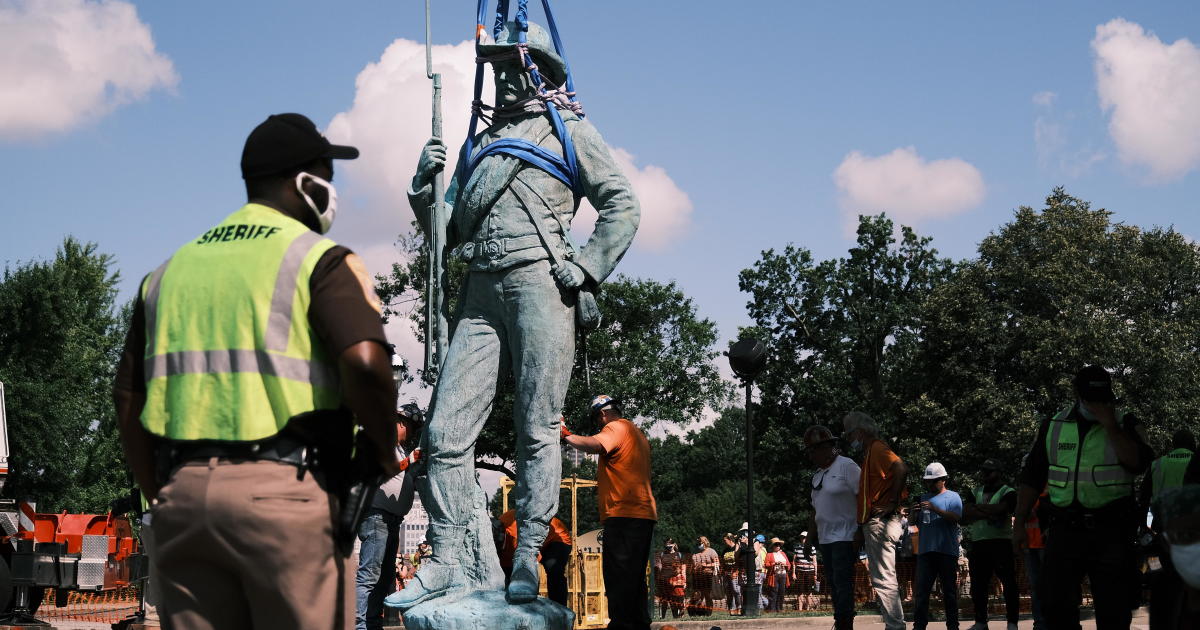“Changing the name of sports teams, changing the packaging of a style of pancake mix. Is it all just a kind of distraction from actual justice and political change?” author John Semley asks. “I think that a question like that is itself a little reductive.”
It’s a question explored in depth in the latest CBSN Originals documentary, “Speaking Frankly | Symbolic Justice.” [Watch the video in the player above. It premieres on CBSN Sunday, Sept. 27 at 8 p.m. ET/PT.]
Protests across the country this summer in the wake of George Floyd’s death focused attention on the problem of police brutality in communities of color. But this time, activists also zeroed in on other ways racism has often been overlooked or reinforced in American society.
There were renewed calls for the removal of Confederate statues and racist team mascots. Popular music groups renamed themselves and major companies scrambled to redesign or retire outdated and offensive brand images.
But as quickly as the conversation turned to oppressive imagery and language, some also questioned if it was the right conversation to have.
“I think the conversation about imagery reminds me that, like, the police for instance would love for you to spend all day fighting about the statues, right? They are like, ‘Cool. Please fight about the statues,'” said DeRay McKesson, an activist and one of the co-founders of Campaign Zero.
The history and future of Confederate monumen…
13:24
“Not that the statues don’t matter, right? Symbols of hate encourage hate, so we can get rid of it. But they know that the public conversation normally can only do one thing at a time.”
Undoubtedly, educating the public on the history behind statues of Confederate soldiers, team mascots based on caricatures of Native people, and where images like Aunt Jemima originated is an important step in reckoning with America’s history of exploiting people of color.
“Logos and mascots may seem like a distraction on one level, but they symbolize so much racial oppression and problems that we need to address that it is timely to have these conversations,” said Heather Miller, an enrolled member of the Wyandotte Nation from Oklahoma.
Washington Redskins officially drop name
01:33
However, activists say, the work isn’t over after the re-branding is done. After cities and companies remove these symbols — what action are they taking to create structural change to benefit marginalized communities?
“White supremacy will always sacrifice symbols to maintain structures. They will give you every statue, every flag. They will change the names of every building. And the reason that they’re willing to do that is that they know that all of those symbolic changes are temporary as long as they control the structure,” McKesson said.
Joshua Mannery, student body president at the University of Mississippi, pushed to see a nameless Confederate soldier statue removed from campus. After a three-year campaign, it was finally taken down in July 2020. But actual inequities on campus have yet to be addressed, he said.
“In a perfect world, you could do both,” Mannery said. “You could address the symbolic representations of the worst parts of our history, and address the fundamental inequities and institutions that prevent us from having a truly inclusive and equitable campus. And so for me, I would sacrifice one or two symbolic wins if I got six to eight fundamental wins. But in a perfect world, you wouldn’t have to choose.”
“The university is a perfect microcosm of our country,” he continued. “And so I am worried because I think we’ve already kind of missed the mark as a country.”
The University of Mississippi did not respond to CBS News’ request for comment.
“We can’t say to move forward, we can’t fix the pain, we can’t put a Band-Aid on it, when Black people still have not benefited financially, emotionally and mentally from the horrors that existed in this country,” Christy DeGallerie, a writer and activist, told CBS News.
“Being an ally comes with a transformative justice, and the word ‘transform’ is an action word. You have to physically change something that is happening,” she continued.
How to get government to enact change
10:36
DeGallerie says tangible action, for example, could look like the board of a majority-white company stepping aside to allow new leadership to have a seat at the table.
Instead, what often happens is a form of performative activism — action that may garner good publicity but doesn’t accomplish the deeper work needed to create truly equal opportunity.
“I think that in moments like this where there’s a flare-up of interest, that people will do anything to make it look like they’re doing something,” said McKesson. “So they will appoint a committee, they will give somebody a promotion, they will make a special. They will put somebody on the magazine cover. They’ll take some photos. And when the dust settles you’re like, ‘What changed?'”
Vera Richard Harris, the niece of Lillian Richard, one of the women who portrayed Aunt Jemima in company promotions in the early 1900s, agrees with that sentiment.
Heirs of real Aunt Jemima sue for $2 billion
03:11
“If I let the statues and the images in all the news… if I start focusing on that, I will not focus on what’s important in November. So I think we have to be careful as African Americans, we have to be careful as a people of color, to not get distracted,” she said.
“Image removal is important. The statues, removing them are important. But systemic racism still exists.”
CBSN Originals presents “Speaking Frankly | Symbolic Justice” is available to stream now in the video player above. It premieres on CBSN Sunday, September 27 at 8 p.m., 11 p.m. and 2 a.m. ET.
Download the free CBS News app on your mobile or streaming device. CBSN streaming is available on all major platforms, including iOS, Android, Roku, Amazon, Apple, Samsung and Pluto.
